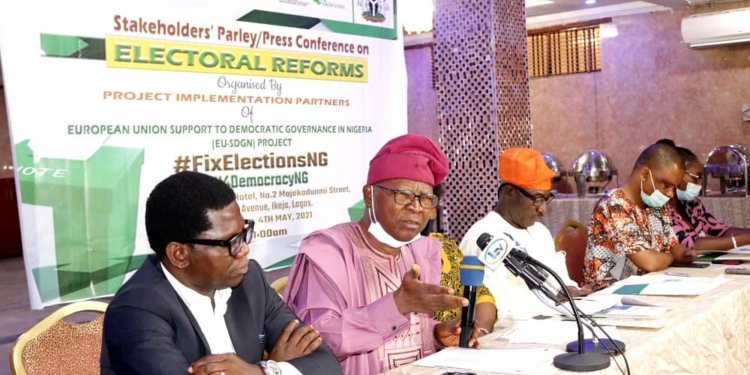The International Press Centre, Institutes of Media and Society and other implementing partners of the European Union Support to Democratic Governance in Nigeria (EU-SDGN) Project have called for the adoption of citizens’ priorities in the 2021 Electoral Amendment Bill.
The groups called on the National Assembly to ensure that citizens’ voices are adequately captured in the Electoral Amendemnet Bill.
The call was made during a press conference jointly convened by IPC and IMS, following a meeting which was earlier held within the premises of the National Assembly to reiterate the need for the adoption of a set of citizens’ priorities for the 2021 Electoral Amendment Bill.
Speaking during the Press Conference, Mr. Lanre Arogundade, Executive Director, International Press Centre explained that, “we are here gathered to further amplify these and related issues for the purpose of enlisting the support of the media, as the fourth estate of the realm, with the constitutional mandate to monitor governance and hold the government accountable to the people, for the citizens-driven electoral reforms that we seek.”
READ MORE – https://bonewssng.com/electoral-reforms-groups-demand-protection-of-voting-rights-of-pwds/
Mr. Arogundade thereafter tasked “the media to ensure that the National Assembly is accountable to key stakeholders in the Nigerian electoral process in making any amendments.
“Among these stakeholders are the civil society, the women, the youths, persons with disability and the election management body itself – the Independent National Electoral Commission.
“Any amendment that fails to reckon with the demands of these groups will not help to strengthen the electoral processes,” he added.
Dr. Akin Akingboulu, Executive Director, Institute for Media and Society (IMS) said that there is a very high expectation from the media, adding that the Electoral law must make provisions for the media to do its job effectively.
He implored the media to ensure equal coverage of political activities of various parties as well as vulnerable persons within the political space.
“Expectation from the media is very high, because the media has an important role to play in the country. Thus, in covering political parties, there should be fair and equal coverage to address the low coverage of women and persons with disabilities during elections”.
Speaking on the need to ensure that the electoral law targets all citizens group, David Anyaele Executive Director Centre for Citizens with Disability (CCD) disclosed that persons with disabilities are faced with great challenges during the electoral process.
“Our greatest challenge is having access to take political roles. People think because of our condition, we cannot partake in the electoral process. We also struggle to be at the voting stand”.
READ MORE – https://bonewssng.com/media-professionals-commit-to-disability-inclusive-reporting/
Highlighting the challenges women face in the electoral process, Mary George-Peluola, Director of Programs Women Advocate Research and Documentation Centre (WARDC) said that her organization trained about 3000 women for electoral positions but only a few were able to pull through to the end.
“There are a lot of things that do not make the electoral process favourable to women who want to aspire for positions,” adding that, “some women are afraid to move close to any form of politics because majority of the population are men and when it comes to decision making, their opinion does not count. More women need to be encouraged to the final stage of the electoral process”.
Mrs. Adeola Ekine Chairperson, Nigeria Association of Women Journalists (NAWOJ) Lagos State Chapter, said that there is a need for women to support women.
There is need for women to support women in every area especially in politics. There should be an equal opportunity distributed amongst the gender because we all pass through the same walls of institutions of learning, so it will be biased to call some gender weak”.
Dare Durosimi, Chairman of Lagos State Council of Radio and TV theatre/Art Workers Union, added that media houses should provide life insurance for journalists during the electoral process.
Durosinmi also said that INEC should adopt the use of technology in the electoral process.
“The adoption of technology in the electoral process through electronic accreditation of voters, electronic voting, electronic collation and transmission of results would aid free and fair elections in the country”.

